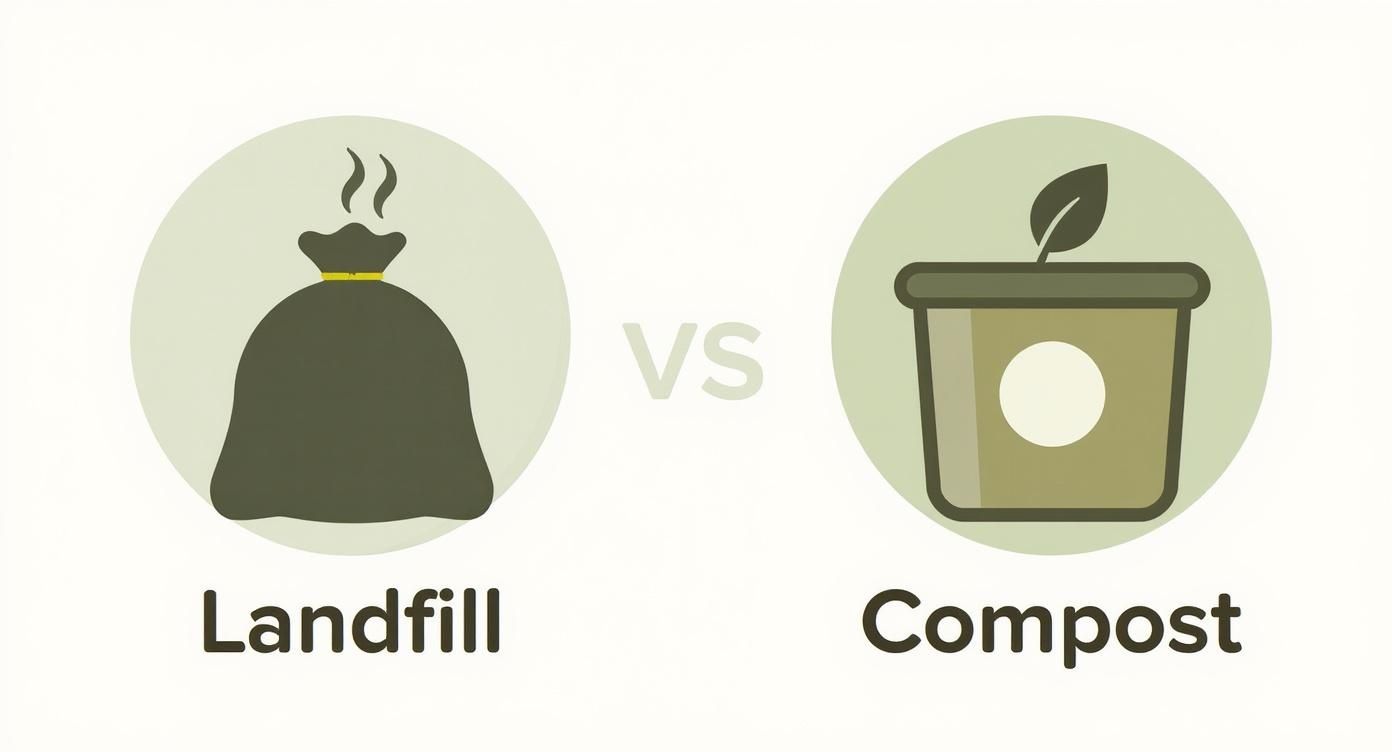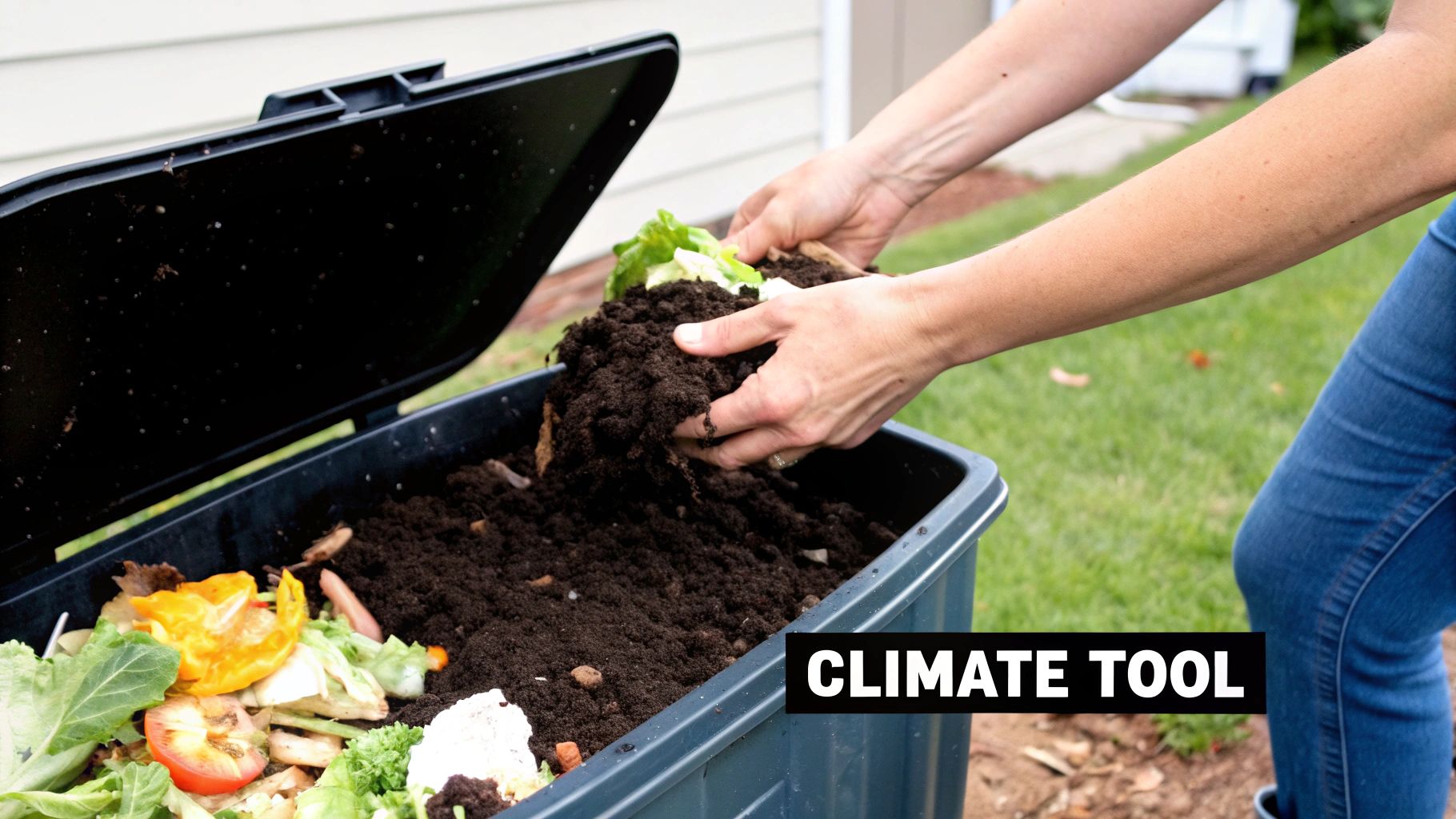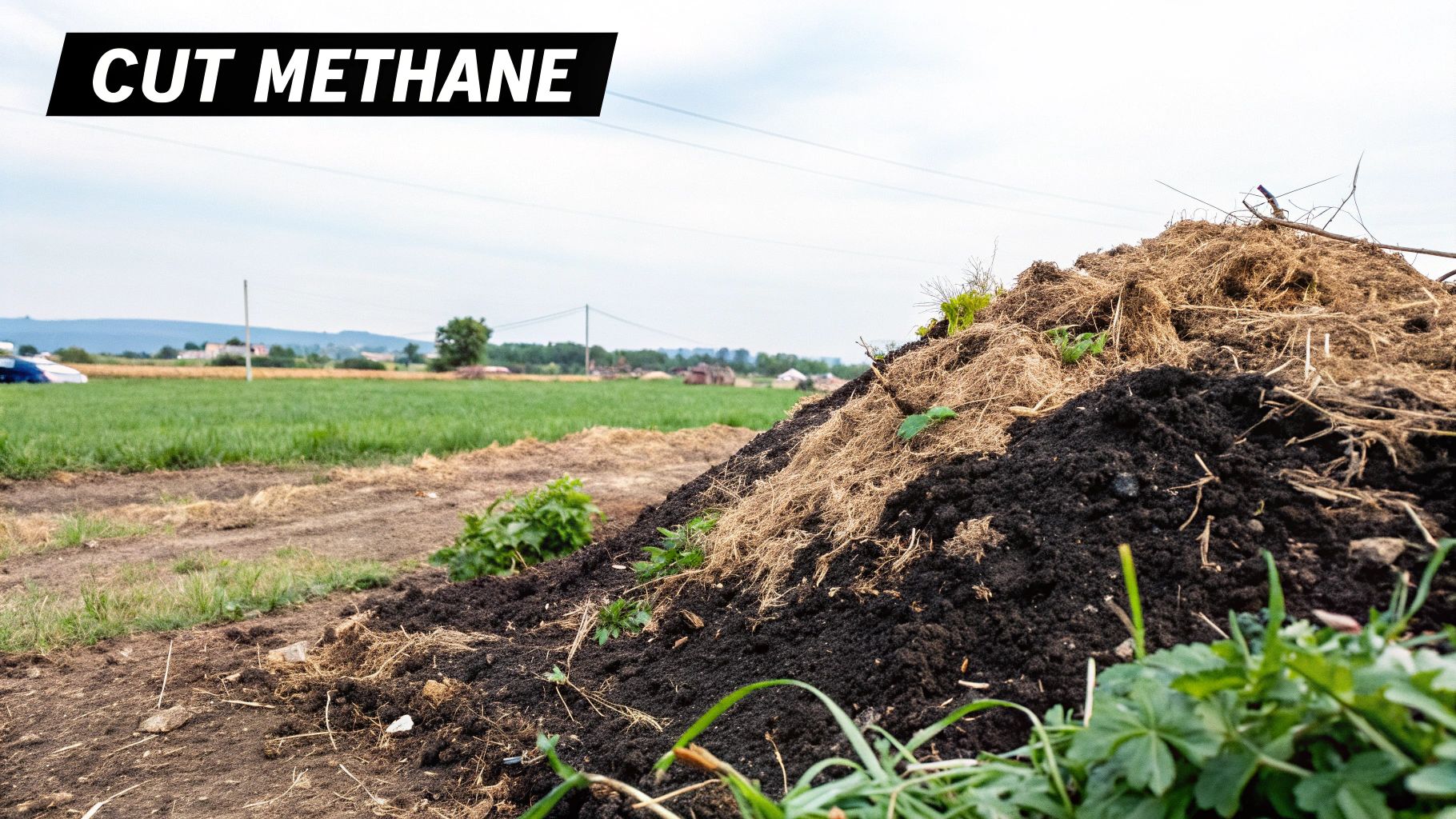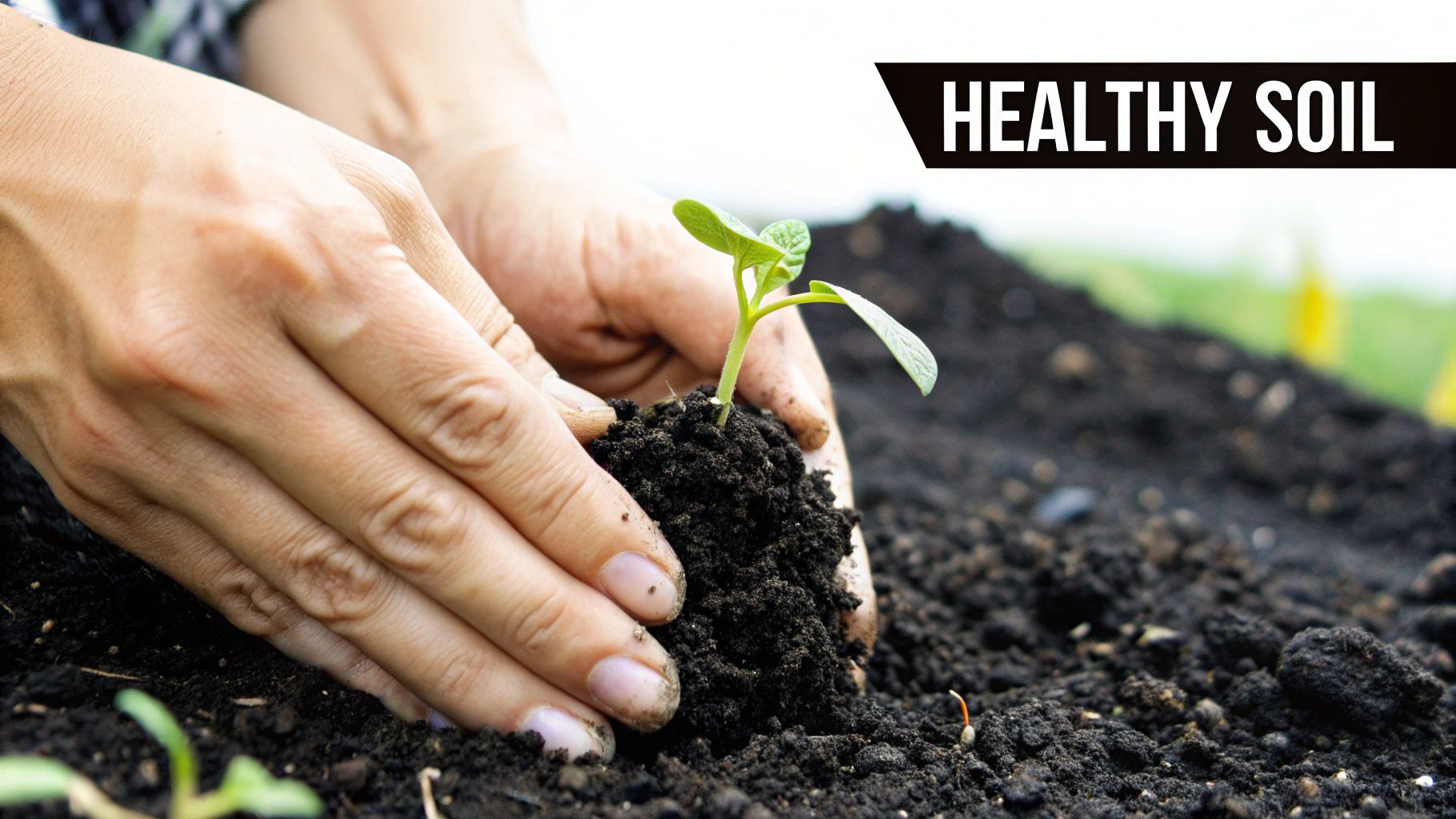
How Does Composting Help the Environment? It’s Your Secret Weapon for a Healthier Planet
Share
The answer is simple, yet revolutionary: composting takes your everyday kitchen scraps from being a climate catastrophe in the making and transforms them into a powerful environmental solution.
Instead of rotting in a landfill and pumping out super-polluting greenhouse gases, that exact same organic waste becomes a nutrient-rich superfood for the earth. It’s a small, daily act that unleashes a massive positive impact.
Your Compost Bin Is A Powerful Climate Tool
Picture a landfill. It's not just a dump; it's a massive, sealed-off tomb where your food scraps are trapped without air. In that suffocating, oxygen-starved environment, they decompose into methane, a greenhouse gas over 28 times more potent than carbon dioxide at trapping heat in our atmosphere. This is the real, hidden cost of throwing food away.
Now, imagine a compost pile. It's a completely different world. It’s a bustling, open-air kitchen where billions of microscopic chefs—microbes, bacteria, and fungi—get to work. Fueled by oxygen, they expertly "cook down" that same waste, transforming it into life-giving soil without creating that devastating methane. This is the critical choice we make every day.
The infographic below brings this stark reality to life, showing the two completely different fates your food scraps can have.

Seeing it laid out like that makes the choice crystal clear. Our waste can either become a source of pollution or a key to regenerating the planet. When you choose to compost, you are stepping directly into that positive cycle, becoming a part of the solution.
The Three Pillars Of Composting's Impact
So, how exactly does composting make such a monumental difference? It comes down to three core benefits. Each one is a huge win for the planet, and it all starts with the simple decision you make in your kitchen.
Composting is one of the most direct and accessible actions you can take. Understanding this is a vital first step as you learn how to reduce your environmental footprint in other powerful ways, too.
The true magic of composting is that it completely rewrites the story of our waste. This isn't just about getting rid of trash; it’s about creating a resource that actively heals the earth instead of harming it.
Here's the breakdown of how your choice to compost helps:
- Slashing Landfill Waste: Food scraps and yard trimmings make up an enormous portion of what we throw away. Composting keeps this valuable organic matter out of our overflowing landfills, where it would otherwise cause immense harm.
- Fighting Climate Change: By providing an oxygen-rich environment for decomposition, composting all but eliminates the production of methane from organic waste. You are directly cutting off a major source of greenhouse gas pollution.
- Building Healthy Soil: Finished compost is like a super-vitamin for the earth. It helps soil hold more water, prevents erosion, and nurtures healthy, resilient plants—all without the need for chemical fertilizers that pollute our planet.
Each of these pillars proves that your compost bin is far more than a place for garden clippings—it’s a hands-on tool for environmental restoration.
Compost vs. Landfill The Environmental Outcome
To truly grasp the power you hold, let's look at a side-by-side comparison. This table reveals the shocking contrast between what happens to organic waste in these two very different environments.
| Environmental Factor | Landfill (No Oxygen) | Compost (With Oxygen) |
|---|---|---|
| Greenhouse Gas | Produces methane, a potent GHG | Produces minimal CO2, no significant methane |
| End Product | Waste that pollutes and takes up space | Nutrient-rich soil amendment (humus) |
| Soil Impact | None; contributes to land/water pollution | Improves soil structure and fertility |
| Water Cycle | Contributes to leachate (toxic liquid) | Helps soil retain water, reducing runoff |
| Resource Cycle | Breaks the natural cycle of decay | Closes the loop, returning nutrients to soil |
As you can see, the outcome couldn't be more different. One path leads directly to pollution and waste. The other creates a valuable resource that gives back to the earth, restoring the balance we so desperately need.
Shrinking Our Overburdened Landfills
One of the most immediate and tangible ways composting helps the environment is by tackling our massive landfill crisis. Think about it: every single day, we throw away mountains of organic material—apple cores, coffee grounds, grass clippings—that could be turned into something incredibly valuable. Instead, we bury it, and that’s where the real trouble begins.

The numbers are staggering. Globally, we generate over 2 billion tons of biodegradable agro-waste every year, and that figure is on track to jump by an alarming 70% by 2050. Right here in the U.S., more than a third of everything we send to landfills is compostable material. It’s a mountain of squandered opportunity.
The Banana Peel: A Tale of Two Fates
Let's make this personal. Picture a single banana peel.
When you toss it in the trash, it’s sent to a landfill, crushed under tons of other garbage. In that suffocating, oxygen-free environment, it can't break down the way nature intended. It rots anaerobically—a slow, ugly process that releases methane gas and contributes to a toxic sludge called leachate that poisons our groundwater. That one little peel becomes a long-term polluter.
Now, let’s see its heroic alternative. When that same peel goes into a compost bin, it joins other organic materials in an oxygen-rich paradise where microbes and worms work their magic. Instead of creating pollution, it breaks down into dark, crumbly, nutrient-rich soil. It becomes food for the earth.
Composting isn’t just about managing trash. It is a conscious act of defiance against a throwaway culture. It is a choice to redirect a valuable resource from a path of pollution to one of regeneration.
That simple choice—trash can or compost bin—makes a world of difference. One path creates waste and damages the environment, while the other creates life and helps heal it. Collecting these scraps is getting easier all the time, especially with tools like compostable bags for food waste.
Reclaiming Space and Resources
Beyond preventing pollution, composting confronts the very real crisis of our overflowing landfills. We are literally running out of space to dump our trash. Every single bag of food scraps or yard trimmings you compost is one less bag taking up precious space for decades.
This is more than just a small act. It’s a powerful way to reclaim a valuable resource and ease the immense pressure we're putting on our planet. When you start to investigate the broader environmental impacts of waste, you see just how urgent this mission is. Composting is a direct, hands-on way for you to reduce your footprint and help build a healthier future, one peel at a time.
Cutting Methane Emissions To Fight Climate Change
Saving space in our landfills is a huge victory, but composting is also one of the most direct ways any of us can fight climate change. The reason is simple: it stops a powerful, and often underestimated, greenhouse gas in its tracks: methane.
Think of our planet’s atmosphere as being wrapped in a blanket. Carbon dioxide (CO2) adds a thin layer, but methane is like throwing a thick, heavy wool blanket on top. It traps a devastating amount of heat, especially in the short term, which is why tackling methane is absolutely critical right now.
The Landfill Methane Problem
When you throw food scraps into the trash, they are buried under tons of other garbage in a landfill. Sealed off from the air, they enter a world without oxygen. This creates the perfect breeding ground for a process called anaerobic decomposition.
Without oxygen, a specific kind of microbe takes over. As these tiny organisms break down the waste, they belch out huge amounts of methane gas. That gas seeps out of the landfill and pours directly into the atmosphere, relentlessly warming our planet.
This is a much bigger deal than you might think. According to the U.S. Environmental Protection Agency (EPA), municipal solid waste landfills are the third-largest source of human-caused methane emissions in the United States. This means our garbage cans are a shockingly potent weapon in the climate crisis. You can find more details on the devastating link between food waste and greenhouse gases from the USDA.
How Composting Changes The Equation
Composting completely flips the script. A compost pile isn't a sealed tomb; it’s an aerobic environment, meaning it’s teeming with life-giving oxygen.
This oxygen-rich setting allows a whole different crew of beneficial microbes to take over. These microscopic heroes are incredibly efficient at breaking down organic waste, and they do it without producing methane. Instead of a harmful greenhouse gas, they create water, a small amount of carbon dioxide, and the dark, nutrient-rich humus that brings soil back to life.
By choosing to compost, you're not just managing waste—you are actively preventing methane from ever being formed in the first place. It’s about cutting off the problem at its source, right in your own kitchen.
This simple switch from anaerobic (no oxygen) to aerobic (with oxygen) is the secret behind composting's climate-fighting power. It turns what would have been a dangerous liability into a priceless asset for the planet.
Here’s the simple choice we face every day:
- Landfill Path (Anaerobic): Food Scraps + No Oxygen = Methane (CH4)
- Compost Path (Aerobic): Food Scraps + Oxygen = Healthy Soil
What you do with your apple cores and coffee grounds has a real, measurable impact. Composting is one of the most accessible ways for any of us to shrink our personal methane footprint, turning a simple daily habit into a powerful act for the environment.
Creating Healthy Soil To Rebuild Ecosystems
We’ve talked about how composting helps by preventing disasters—like overflowing landfills and methane emissions. But that’s only half the story. Now, let’s look at how composting actively creates good for the planet by building the very foundation of life on land: healthy soil.

Think of finished compost as a life-saving supplement for the earth. Decades of intensive farming and urban development have left so much of our soil weak, depleted, and lifeless—stripped of the nutrients and microbial life it needs to function.
Compost is the perfect remedy. It breathes life back into the ground, restoring essential organic matter and jumpstarting a vibrant, living ecosystem right beneath our feet.
Building Soil That Acts Like A Sponge
One of the most incredible things compost does is completely transform the physical structure of soil. When you add compost, you create soil that acts like a natural sponge, soaking up and holding onto water far more effectively than dry, compacted dirt.
This is a game-changer for water conservation. When soil holds moisture, plants become far more resilient during droughts, meaning we don't have to water them nearly as often. It also drastically cuts down on stormwater runoff—that destructive rush of water that carries pollutants from our streets and lawns straight into our rivers and lakes. Every bit of compost you mix into your garden helps create a more water-efficient and healthier landscape.
By turning waste into a resource, composting closes the natural loop. It returns valuable nutrients to the earth, building a resilient foundation for healthy plants, thriving ecosystems, and a more stable climate.
Research from sources like the Institute for Local Self-Reliance confirms this, showing that compost boosts organic matter, increases nutrient levels, and supports a massive diversity of beneficial microbes. This all leads to better water retention and less soil erosion—fundamentals for a sustainable future.
Replacing Chemicals With Natural Fertility
For too long, the default solution for growing plants has been synthetic chemical fertilizers. They might give a quick, artificial boost, but their long-term effects are devastating, polluting our waterways and damaging fragile ecosystems.
Compost provides a powerful, all-natural alternative. It’s packed with the essential nutrients plants crave, but it releases them slowly and gently over time. This slow-and-steady nourishment builds strong, healthy plants without the harsh chemical hangover.
Enriching your soil with compost also helps plants naturally defend themselves against pests, perfectly aligning with holistic approaches like Integrated Pest Management strategies for a truly sustainable garden. You're not just feeding your plants; you are healing the entire soil food web. This simple act rebuilds ecosystems from the ground up, proving just how profoundly composting helps the environment.
Ready to Start Composting? Here’s How
Feeling inspired to make a real difference? The best part is that you don’t need a huge yard or any special skills to become a climate hero. Understanding how composting helps the environment is the first step, and putting that knowledge into practice is much simpler than you think.

Seriously, there is a composting method for every single person, from suburban families to city apartment dwellers. Finding the right fit for you just depends on your space and what you plan on composting.
Finding The Right Composting Method For You
Ready to dive in and become part of the solution? Let's explore a few of the most popular and effective ways to get started. Each one offers a different path to turn your waste into a resource the planet will thank you for.
- Traditional Backyard Bins: Got a bit of outdoor space? A classic compost bin or a simple pile is a fantastic, low-maintenance way to transform both yard trimmings and kitchen scraps into black gold.
- Worm Bins (Vermicomposting): This is the perfect solution for small spaces. Vermicomposting uses special worms in a compact bin to break down food scraps quickly and with zero foul odors. You can easily keep it on a balcony, in a garage, or even under your kitchen sink.
- Bokashi Bins: An innovative indoor method, Bokashi uses a special bran to ferment all your food scraps—even meat and dairy. It's a super-fast, space-saving system that pickles your waste before you bury it in the garden.
If you want a closer look at these options, our detailed guide on how to compost at home will walk you through everything you need to know to get started with confidence.
No Bin? No Problem.
Even if you're not ready to manage your own compost system, you can still be a huge part of the solution. Many communities now offer fantastic options that make it incredibly easy to keep your organic waste out of the landfill.
You don't have to do it all yourself. The most important action is simply diverting your food scraps from the trash can.
Check to see if your town has a curbside compost pickup service—they're becoming more and more common. Another great alternative is to find a local community garden or farmer's market that accepts food scrap drop-offs. These programs take all the guesswork out of it, letting you contribute to a healthier planet right away.
A Few Common Questions About Composting
https://www.youtube.com/embed/iTndncUezAk
Even after you're sold on the incredible benefits of composting, a few practical questions always seem to come up. Let's tackle the most common concerns so you can get started with total confidence.
Will My Compost Pile Attract Pests or Smell Bad?
This is the number one worry for most people, but it's completely avoidable. A healthy, thriving compost pile should smell earthy and rich, like a forest floor after it rains. It should never smell foul.
If you notice a sour or garbage-like odor, that’s just a signal your pile is out of balance. It almost always means things have gotten too wet and you need more "browns"—think dry leaves, shredded cardboard, or small wood chips. These carbon-rich materials create vital air pockets and soak up excess moisture, which is the secret to keeping smells at bay.
As for pests, the golden rule is to never add meat, dairy, or oily foods to a standard home compost bin. That, combined with a secure lid, will keep unwanted critters away.
Can I Still Compost If I Live in an Apartment?
Absolutely! You don’t need a big backyard to make a huge difference. There are some brilliant options designed specifically for smaller living spaces.
- Vermicomposting (Worm Bins): These are compact, self-contained systems where red wiggler worms do all the hard work. They process food scraps incredibly fast, produce no odor, and can easily be kept indoors or on a small balcony.
- Bokashi Bins: This is a fantastic indoor method that essentially pickles your food scraps through fermentation. It’s very quick, handles things like meat and dairy that traditional piles can't, and takes up minimal counter space.
- Community Options: Look into what your city offers. Many areas now have curbside compost pickup services or community gardens with designated drop-off spots, making it incredibly easy to participate without managing your own bin.
The goal isn't to have a giant compost heap in your yard. The real environmental win comes from diverting your food scraps from the landfill, no matter how you do it.
How Do I Know When My Compost Is Ready to Use?
You’ll know it’s ready when you can no longer recognize any of the original food scraps. The finished product will be a dark, crumbly, and uniform material that looks and feels like rich, healthy soil. It will also have that signature pleasant, earthy smell.
The entire process can take anywhere from a few months to a full year, depending on your composting method and how actively you manage it. Once it's done, you've created "black gold" ready to work its magic. Mix it into your garden beds, sprinkle it on your lawn as a natural fertilizer, or blend it into the potting soil for your houseplants.
Ready to take the next simple step? Using the right bags makes collecting scraps clean and easy. At terravera, we provide high-quality compostable bags to help you start your journey toward a healthier planet. Explore our products at https://www.myterravera.com.
